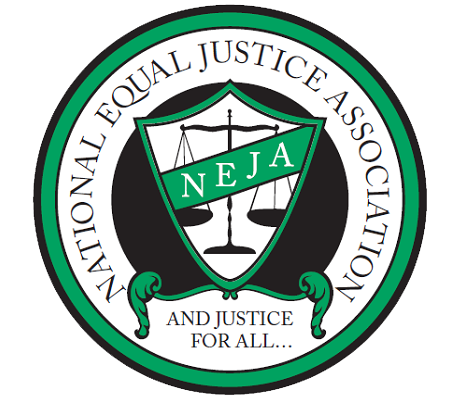NEJA's Campaign to Abolish Prison Slave Labor
National Equal Justice Association's (NEJA) Prisoner Justice Fund aids efforts of legal and prisoners' rights organizations, friends and families of prisoners, and other groupings nationwide struggling to abolish the prison slave labor system and the unjust legal and law enforcement systems that feed it.
The U.S. prison industrial complex is the largest in the world where over 7 million low-income and minority prisoners, over 25% of the global prisoner population, are exploited with hourly wages of as little as zero cents to $1.25 per hour in a $40 billion industry that benefits large corporations. That's one in fifty Americans, or, for Americans born in the year 2000, the chance of spending some time in a correctional facility is one in twenty. For African Americans, this probability increases to one in four, more than five times that of white Americans. Ten percent of prisoners serve a life sentence. Another 10% are doing more than 20 years, and 10% of prisoners are housed in private facilities. Meanwhile, “good” paying jobs and benefits continue to disappear in our local communities and education, child welfare and social service programs are slashed.
The U.S. prison population has grown 700% subsequent to Congressional passage of the Percy Amendment in 1979, which created the Private Sector/Prison Industry Enhancement Certification program (PIE) reversing restrictions on the shipment of prison-made goods through interstate commerce. Use of convict labor by commercial enterprises now exists in 37 states. Major corporations such as Microsoft, CMY Blue, American Express, Bank of America, Starbucks, J.C. Penney, Chevron, Honda, Levi Strauss, The Gap, Lee Jeans, Victoria's Secret, Revlon, Sprint and McDonalds have joined hundreds of others in using cheap prison labor for their profit.
CoreCivic, formerly Corrections Corporation of America (CCA) and The Geo Group, formerly Wackenhut, run private correctional facilities, including immigration detention centers, in the U.S. This portion of the private economic sector is growing. CoreCivic, a multi-billion dollar company headquartered in Nashville, TN, is the largest of the private prison corporations, owning and/or operating 53 facilities nationwide. They contract with local, state and federal governments to run prisons at costs of $30 to $60 per bed, per day and ensure their profits by reducing essential services within the prison — from medical care, food, and clothing to staff costs and security — endangering the public, inmates and staff.
Eighty percent of America's prison inmates are parents. One in 28 children in the U.S. has a parent behind bars, up from one in 125 just 25 years ago. One in every three women held prisoner in the world is in the U.S. and low-income women of color are disproportionately likely to spend time behind prison walls.
- NEJA grantee Prison Policy Initiative (PPI) spearheaded an intensive telephone, email, petition, research and publication campaign to successfully force the Federal Communications Commission to enact rules limiting the exorbitant phone rates that telephone companies, holding monopoly contracts, charge to inmates and their families for calls from prisons, which went into effect in 2014. PPI is continuing to struggle to maintain the FCC regulation and working with local and state bodies to enact similar rules.
- The NEJA Bulletin covered the largest prisoner strike in the nation in 2016, where 24,000 prisoners in up to 29 prisons nationwide, across at least 12 states, went on strike to protest prison slave labor and other exploitative practices they face in the U.S. prison system, where the National Freedom Movement Against Mass Incarceration and Prison Slavery led strikes which lasted from September to October of that year, from California to New York, Michigan and Alabama, bringing together prisoner organizations and their allies.
- NEJA is fighting to end the unconstitutional practice of prison gerrymandering, which fundamentally distorts how political decisions are made. This is the once-hidden, flawed U.S. Census process which gives extra representation to the legislative districts that host prisons and less representation to everyone else because it is counting people in prison where their bodies are held, not where they lived prior to incarceration and where they often return upon release. Hundreds of civil rights and criminal justice reform organizations are urging the Census Bureau to change its outdated methodology.
Graphic courtesy of incarcerated workers organizing committee
NEJA conducts campaigns against systemic discrimination including for prisoners and their families, and organizes resources in support of local struggles for equal justice in low-income communities targeted for exploitation by mammoth corporations and special treatment by government agencies.
NEJA needs volunteers to join our campaign to abolish modern day prison slave labor and for prisoner justice. NEJA needs volunteers to assist with public speaking engagements and outreach activities to university and colleges, unions, religious congregations on behalf of prisoners and their families struggling for equal justice. NEJA needs volunteers to assist in coordination of publication and writing for NEJA. Full- and part-time opportunities are available. No experience is necessary. Join the winning fight for equal justice for all workers now. Call (415) 552-5833 today.




